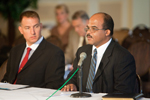State Supreme Court Launches Nation's First Online Training for Veterans' Court Mentors, Nov. 9, 2011
The Supreme Court of Pennsylvania has joined state and national veterans' groups in seeking volunteers to assist former servicemen and servicewomen who come into contact with the criminal justice system. As part of the effort, an online training program - believed to be the first of its kind in the nation - has been launched to enhance access and increase the number of people wanting to become mentors. Click here for the announcement by the Administrative Office of Pennsylvania Courts.
 PBA MVA Committee Co-Chair Payne Testifies on Special Veterans Courts, Sept. 7, 2011
PBA MVA Committee Co-Chair Payne Testifies on Special Veterans Courts, Sept. 7, 2011
Wesley R. Payne IV, shown above at right, co-chair of the PBA Military and Veterans' Affairs Committee, testified on the issue of special veterans' courts at a joint hearing of the state House Judiciary and Veterans Affairs & Emergency Preparedness committees held Sept. 7, 2011. Click here for the text of the PBA statement to the committees.
Veterans' Courts: Early Outcomes and Key Indicators for Success , by Justin G. Holbrook and Sara Anderson, Widener University School of Law, Aug. 11, 2011
Hospital and Outpatient Care for Veterans Released from Incarceration to Transitional Housing, Federal Register of March 2, 2011
Draft VHA Directive on Veterans Released from Prison or Jail to a Temporary Housing Program, March 2011
Veterans Justice Partnership Calls for Volunteer Veteran Mentors, February 2011
The Pennsylvania Veterans Justice Partnership has issued a call for veteran mentors to assist fellow veterans who are struggling with substance abuse or mental health problems and come into contact with the criminal justice system. Click here for the Feb. 24, 2011, news release, as posted on the Administrative Office of Pennsylvania Courts' website.
Veterans' Courts and Criminal Responsibility: A Problem Solving History & Approach to the Liminality of Combat Trauma , by Justin G. Holbrook, Widener University School of Law, Nov. 10, 2010
Pennsylvania Veterans and the Criminal Justice System, Adjustment, Reentry and Associated Problems, a report by Bradley Schaffer, coordinator, Veterans Justice Outreach (VJO) at the Butler VA Medical Center, May 2010.
Plans for Special Veterans' Courts Now in Development, December 2008
Cheryl Lynne Austin, eastern regional vice chair of the PBA's Military and Veterans' Affairs Committee (MVA), on behalf of the committee, recently attended an informational meeting held by the Pennsylvania House Judiciary Committee's Subcommittee on Courts. The meeting was led by state Supreme Court Justice Seamus McCaffery, who discussed the need for and benefits of special courts, namely for veteran defendants and defendants with mental health and/or substance abuse issues.
A model veterans' court, established in Buffalo, N.Y., on Jan. 15, 2008, was featured. Judge Robert T. Russell, presiding judge of the Buffalo Veterans' Court, described the court's mission as seeking to divert eligible veteran-defendants with substance dependency and/or mental illness that are typically charged with felony or misdemeanor non-violent criminal offenses to a specialized criminal court. The court substitutes a treatment, problem-solving model for traditional court processing. Veterans voluntarily participate in a judicially-supervised treatment plan that a team of court staff, veterans' health care professionals and veteran peer mentors develop with the veteran. The plan includes regular status hearings, conditions, incentives and sanctions. Many have their charges dismissed upon successful completion, and others are assured of a non-incarcerative sentence upon completion.
As with any new initiative, funding is a key concern, and Justice McCaffery asked the legislators present to consider creating a separate line item in the state budget to pay for special courts. In limited jurisdictions around the state, county commissioners fund local special courts. Bridget Gillespie, a member of the PBA MVA and co-chair of the Allegheny County Bar Association MVA, in conjunction with the Veterans' Leadership Program, reports that a few months ago the ACBA MVA started an initiative to set up a veterans' court in western Pennsylvania. Common Pleas Judge Michael McCarthy, a ACBA MVA member before he assumed the bench, has spearheaded the Allegheny County initiative, speaking with and visited Judge Russell in Buffalo, suggesting the program to the Allegheny County President Judge Joseph James and obtaining approval. They hope is to have the veterans' court up and running in Pittsburgh shortly.